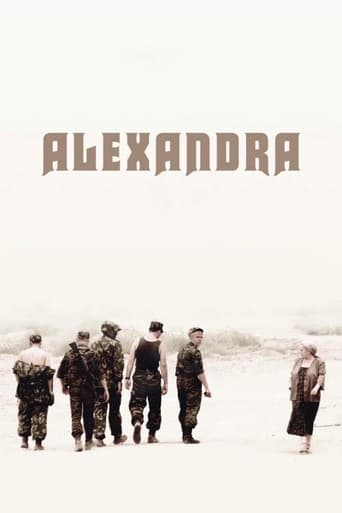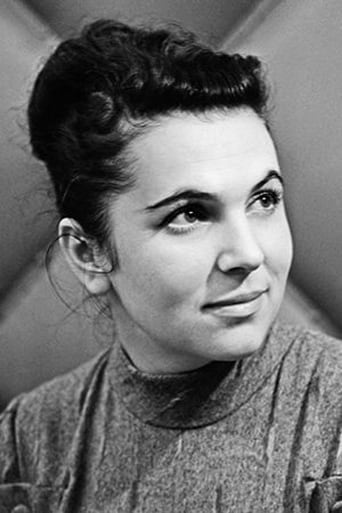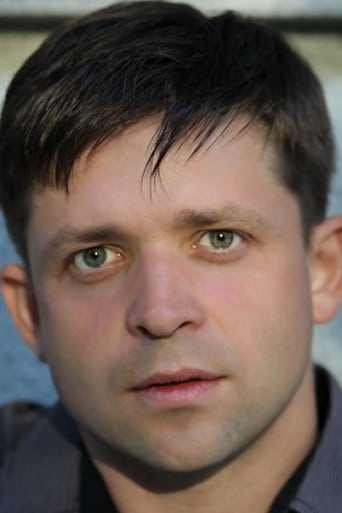Alexandra (2007)
Elderly Aleksandra visits her Russian soldier grandson, Denis, at the Chechen war front, providing comfort as she tours his army. All the while, Denis ponders the reason for her unexpected appearance.
Watch Trailer
Cast


Reviews
best movie i've ever seen.
Although it has its amusing moments, in eneral the plot does not convince.
I cannot think of one single thing that I would change about this film. The acting is incomparable, the directing deft, and the writing poignantly brilliant.
It is an exhilarating, distressing, funny and profound film, with one of the more memorable film scores in years,
I am getting a little tired of Russian films that make claims to universality of theme and yet are packed with obscure (to me as a Westerner) and specific cultural cues. You can't have it both ways. At least I hope that was what was going on. Otherwise I would have to say that many of the exchanges between characters were fraught with mechanical sentimentality, were oddly disturbing (as when Alexandra takes a deep whiff of her grandson's manly aroma)or just downright incomprehensible.Alexandra's grumpy, tough as nails old Mother Russia come to inspect her sons embroiled in yet another war is understandably cranky. Having survived the hell on earth of WW2 Russia would wouldn't be a little impatient with all things military? But while the actress carries the role with some gravitas, she is surprisingly unsympathetic and never more so as when she stops to deliver the director's pearls of wisdom regarding the relative merits of brute force versus intelligence to a surly Chechen youth or discusses with her grandson the autocratic structure of the Russian family - or was that government? Even an uninitiated Westerner can detect when a filmmaker breaks into his own film to use his actors as mouthpieces. It's not only jarring and annoying - it bespeaks a failure to convey these thoughts within the framework of character and action. Only when Alexandra encounters other women does she soften and become more accessible but I'm afraid most of the credit for the emotional connectivity of those scenes goes to the woman playing the Chechen cigarette vendor. While I enjoyed those scenes, they were nonetheless somewhat suspect for me, smacking of oversimplified beneficent sexism - women nurturers good, men warmongers bad.On the plus side, it was the specificity of location and the excellent photography of the camp, the crumbling town and the seared countryside that kept me engrossed. The silent tableaux of working soldiers, hostile locals, the machines of war and even grandma traversing this landscape were far more effective and evocative than scenes that included dialog and reminded me that the great strength of Russian film making is traditionally grounded in the purely pictorial. These images, thankfully devoid of distracting and mysterious verbal cues and directorial soapboxing, did succeed where the storyline failed, in transforming the local to the universal.
I don't know many grandmothers that would take a troop train across Russia, then get on top a troop transport to visit their grandson (Vasily Shevtsov), an Army Captain in Chechnya. But this grandmother (Galina Vishnevskaya) did. It was certainly an arduous journey for the elderly woman.The films color is appropriate for the hot and dirty climate where here grandson is stationed. The soldiers are all shirtless and just sit around waiting. The other soldiers watch her with fascination, probably thinking of home and their own grandmothers.She makes her way to the market where cigarettes are priced depending upon you rank. The locals look at the Russians with disgust. She manages to connect with a local, Malika (Raisa Gichaeva), who treats her like a sister.It is not a place for a grandmother, but she manages to connect again with her grandson before he goes off on a five-days mission, and she boards the troop train home.It was only anti-war in a subtle sense. The futility of it all was visible, but not exaggerated. Maybe the futility was finally recognized as the Russians are to leave Chechnya soon.A very good story.
A sublime ode to ordinary people in times of war; a cry, a silent scream for a drop of normal and decent life which was taken away with no particular reason. As the plot, deceptively uninteresting, is dragging towards the end of the film, this silent scream is raising in viewers throats, making you want to explode of anger, finding no answers of why are such things happen if the only thing you want is to live and let live! An excellent display of anti-war emotions, shown through long scenes of shattered and dusty life in a war zone. This film is not only about Chechnya and Russian - Chechen conflict. Every person who experienced grieves of war can find relief after such movie. Very nice peace of art!
In the 1976 comedy Love And Death, Woody Allen finds himself conscripted into the Russian Army about to fight Napoleon's invading French forces. While in basic training, a stern drill sergeant tries to explain the reality of things to the peasant soldiers who will soon shed their blood for Mother Russia.Drill Sergeant - If they kill more Russians, they win. If we kill more Frenchmen, we win.Woody What do we win?This line always gets a laugh (and would be well worth asking any time WE feel the need to go to war), so why did that question come to mind after seeing Alexander Sokurov's breathtaking film Alexandra? I'll come to that momentarily.Alexandra is a film of deceptive simplicity. An older grandmother comes to a remote military base to visit her 27-year-old grand son who is a captain. While there, she is treated as an honored guest, almost like a beloved mascot and she gets to meet many different soldier boys as well as some of the locals who live in the destroyed towns around the base.Described this way, it would be hard to justify to your friends why you want to see a film about an old Babushka groaning around a military base always complaining about the heat for 95 minutes, but then you are not considering the surprises in store from the great Russian director Alexander Sokurov who has been described as a Russian David Lynch, but I think this is mistaken.If you must pigeonhole Sokurov, he has more in common with Gus Van Sant in his experimental mode with films like Last Days, Elephant and the recent Paranoid Park. Like Van Sant, Sokurov's films have seemingly straightforward narratives, but are then made brilliant by an unconventional way of telling the actual story as well as a utilizing unique ways of manipulating sound and image.What ultimately happens if you allow yourself to be seduced by the film, is the whole thing becomes an allegorical examination of the Russian soul and a meditation on why they often find themselves in no-win situations like Chechnya, which Alexandra is clearly about.But there are many things that I, as an American may not appreciate fully. For example, the solemn type of poetic love that Russians have for their mothers that is evident in everything from their literature to their music to their theater, (Americans loves their mothers too, but it is a bit different).I also can't fully understand the helpless feeling they have of being a "former" world power that finds itself bogged down in a country it could have once blown right off the map, but can now do nothing. (Don't worry; America could get there yet if we don't stop these Neo-Con morons with their selfish pursuits disguised as patriotism.)Then there is the casting of the film. The soldiers are all well played by handsome young actors with sweet, youthful faces, but it is the solid presence of Galina Vishnevskaya as Alexandra that holds this film together. I have read she was a well-known opera singer in Russia and considered a national treasure, although I was not familiar with her before this film.Considering what Galina Vishnevskaya had to do; literally embody Mother Russia as a concept while never ever losing her humanity, her performance is wonderfully understated, yet never less than powerful and compelling.It won't happen, but if Daniel Day Lewis can get an Oscar for grossly over-playing an evil oilman in There Will Be Blood, I hope Galina Vishnevskaya can at least get an Oscar nomination for portraying the historical soul of a nation all the while making her human and understandable.It is rare that films ever tackle things allegorically. That is usually reserved for the theatrics of the stage or the interior realms of the mind in a novel. Even if it were something that could be done more often, most Americans would not accept it.The American style of story telling is straightforward and blunt; whereas allegory relies on symbolism, and a transubstantiation of ideas and concepts into dramatic characters and situations.To many people, this all feels like trickery and they remain closed off to the richness of allegory, especially in the arts. Yet, crazily enough, they have no trouble accepting it every Sunday in church where Christians by the thousands believe that ordinary wine and bread get turned into the Blood and Bone of Christ.It really doesn't happen folks, (except symbolically) or that would make you cannibals. So if you can accept that kind of symbolic allegory and transmutation of concepts in church, it requires only a little bit more imagination to accept it in a film. Please try. You don't know what you're missing.Getting back to my opening citation of Love And Death and why Alexandra made me think of it, well, at the end of the film, as Alexandra is on her way back home, she looks at the passing Chechen countryside through the door of her train.It is dry, hot, and pretty much a wasteland. Yet, this is the very land the Chechens are more than willing to die for and really, what possible use could it be for the Russians? I hope Alexandra is considering Woody Allen's surprisingly simple, yet devastating question, after all the terror, all the horror and all the killing is over, "What do we win?"It turns out the answer is rolling right past Alexandra's eyes, outside the train door.Nothing.







